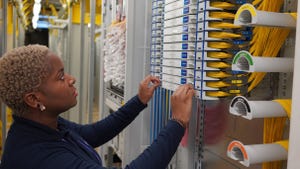Cloud Bursts: Oracle Touts Telco Triumphs, Microsoft Proclaims Partnerships & More
Oracle sells to Asian telco Circles.Life; Microsoft partners with Sony on gaming; VMware acquires Bitnami for multicloud, and more telco cloud news this week.

In this roundup: Oracle touts new telco customers and products; Ooredoo Qatar taps Nokia; Microsoft and Sony partner on gaming; VMware acquires Bitnami for multicloud; and more telco cloud news from this week.
Asian service provider Circles.Life is to deploy Oracle's monetization engine to allow customers to customize plans directly through an app, helping to drive international expansion and develop new products. Circles.Life claims to be "Asia's first fully digital telco."
Oracle launched its Oracle Enterprise Catalog for Communications, which is designed to help communications service providers easily launch new service offers and tailor them to specific customer segments. "For example, a CSP can quickly launch a compelling new digital content offer -- one that might include music, video, 5G and an IoT-based digital assistant -- by easily configuring its pricing, discounts and promotions for various channels and fulfillment paths -- all from one central platform," Oracle says. Oracle expects the new tool to become commercially available during its fiscal year 2020, which starts next month.
Additionally, ORS Group has selected the Oracle Digital Experience for Communications platform to help it deliver TV and radio services via terrestrial, satellite, cable and IP networks, part of its evolution from network operator to digital content gateway. The platform includes Oracle Communications Billing and Revenue Management, providing subscription management for digital, media and 5G services.
Sony and Microsoft signed a Memorandum of Understanding (MOU) to collaborate on new Microsoft Azure platforms for gaming and the possibility of incorporating artificial intelligence tools in Sony consumer products. The duo will also explore the possibility of collaborating on semiconductor developments. Microsoft rival Google recently announced Stadia, its own cloud-based streaming gaming service.
SK Telecom and Microsoft have signed a memorandum of understanding (MOU) to cooperate on developing information and communications technology -- including 5G, artificial intelligence and cloud -- for smart factories and other Internet of Things applications, as well as media and entertainment services.
Ooredoo Qatar selected Nokia to build a 5G cloud native core network in Ooreedo's data centers in Doha, Qatar's capital city. Ooredoo will: Implement Nokia AirFrame for data center infrastructure; deploy Nokia's cloud Virtualized Network Functions (VNFs), including Mobile Core for Voice with Cloud Packet Core, Subscriber Management Registers and policy control; CloudBand for managing virtual infrastructure and VNF lifecycles; NetAct for network management; Nuage Networks from Nokia for software-defined networking and datacenter automation; and Nokia professional services.
Riverbed launched Riverbed SaaS Accelerator, which it claims accelerates performance up to 10x for leading cloud apps such as Microsoft Office 365, Salesforce, ServiceNow and Box. The company also enhanced its SD-WAN solutions, SteelConnect and SteelHead SD.
VMware plans to acquire Bitnami, which packages up applications and development stacks for easy deployment on major cloud and Kubernetes environments. Bitnami provides "the latest versions of validated and highly secure application packages -- many of them from open source ISVs -- that enable developers to hit the ground running when building new applications and services on any cloud," VMware said. Bitnami was primarily bootstrapped, along with $1.1 million from YCombinator and angels, and was "already profitable" when it raised the funding, according to a post announcing the VMware deal on the Bitnami blog. VMware acquired Kubernetes startup Heptio for $550 million and CloudHealth Technologies, for multicloud operations, last year.
Google Cloud launched its second region in Japan, in Osaka. That's seven in Asia-Pacific and the twentieth region overall, all with three availability zones for resilience and performance. Google plans additional regions in Seoul, Salt Lake City, and Jakarta. Microsoft Azure also has two regions in Japan, but Amazon Web Services only has one.
Google says it's working on a new kind of speech translation technology with the delightfully retro-futuristic name "Translatotron." Current translation technologies break the process down into steps -- first converting speech to text, then translating the text, then converting the translated text back to speech. Translatotron would use direct speech-to-speech translation without intermediate steps, to be faster, reduce errors, and -- here's the really cool part -- retaining the voice of the original speaker. Maybe soon my American ears will be able to understand what the heck my British colleagues are saying on staff meetings. Cor blimey, guvnor!
— Mitch Wagner



 Executive Editor, Light Reading
Executive Editor, Light Reading
About the Author(s)
You May Also Like





.jpg?width=300&auto=webp&quality=80&disable=upscale)






